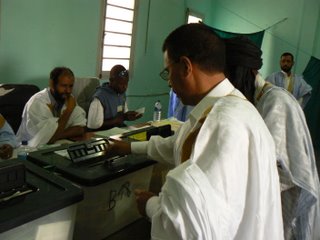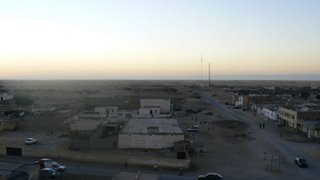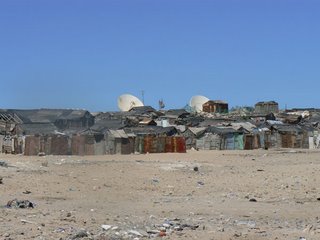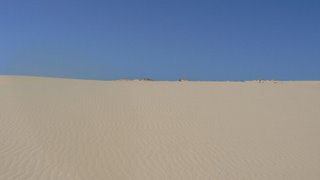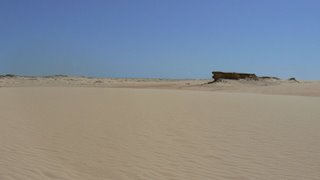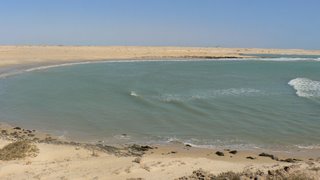[begin transmission]
Alright, I've been meaning to do this for long enough, that, flying in the face of accepted laws of physics, my total lack of inertia has spurred me to action. Reading back through this nonsense, I'm noticing a distinct lack of information regarding just about everything having to do with my life here. This will be my attempt to tackle that. I have the urge to demand a collective renunciation of procrastination as I begin, but I suspect that more than one of you is at work as you read this.
Q: So guy, you've been in Africa for almost three months. What have you been doing all this time?
A: I'm so glad you asked. In the short version, I arrived, spent a miserable week adjusting to the miserable climate, spent the next ten weeks in training, then moved to Nouadhibou. Please feel free to consider this answer comprehensive.
Q: I don't. Please elaborate.
A: Fine. In the more detailed version, I came to Nouakchott via Casablanca. Go see the big mosque there. I slept all day, but everyone else said it was quite nice. I spent the following two days in NKT doing protocol in a compound I was not allowed to leave. After that I was herded into the back of a Land Rover with ten other people, and we drove for six hours, much of it through the Sahara, to Kaedi. This was where I began to realize that I was actually in Africa. Giant orange dunes, bleached bones, and somewhat interestingly, seashells.
The next week in Kaedi was spent in another compound (the high school - Lycee - during the appropriate part of the year) with the rest of the trainees. Until now I had yet to actually wander freely anywhere, but the beginnings of cultural adjustment took a back seat to getting used to the environment. We came in the midst of the rainy (read: hot as fuck) season, occasionally seeing the thermometer hover around 120 degrees F. While mentally I took the heat in stride, my body had altogether different ideas, and my hands and feet immediately exploded in a heat rash that, in addition to looking not unlike some amputation-warranting disease, left my appendages swollen and sore. Paired with generally filthy surroundings, ubiquitous mosquitos, blister beetles, and sun burns, my discomfort was soaring to new heights.
Q: What's a blister beetle?
A: "Blister beetle" is the local, anglicized name given to a number of species of beetles that appear during the rainy season along the Senegal River. Like your average bug, they occasionally land on unsuspecting people, though they don't appear to actively hunt out other creatures. Their name is derived from the fact that when said unsuspecting person brushes it off him/herself, the beetle sprays acid. Within a few hours, the affected skin blisters and fills with some caustic fluid that, if it comes into contact with unaffected areas of skin, causes further blistering. More obnoxious than the actual wound is the constant fear of every single insect that lands on you, of which there is no shortage.
Q: Would you like to offer any ruminations on discomfort?
A: I haven't even gotten to the food, the disease, the flies, the animals, or the people. Patience.
After a week in the womb, I was eventually birthed into a black Moor host family, given the name Adama, and tossed into the routine of my next nine weeks. My host father's name was Baba, his wife was Sahara, her sister was Howa (a note on relations: everyone regards everyone else as a sister or aunt or cousin or nephew; actual blood relation is an arbitrary detail - hence, in the end I still had no idea how anyone was related), and the four daughters, Aicha, Ami, Tarba, and Tselem, all under the age of ten. Baba spoke some French, everyone else spoke solely Hassaniya. For those of you unfamiliar with Hassaniya, imagine a dialect of Arabic spoken 50 decibels louder than the average language. When someone is inviting you to sit down, it's not difficult to mistake their welcome for overt, vituperative, condemnation.
My general routine consisted of Hassaniya classes for between six and seven hours a day, Monday through Saturday. As training continued, the length of the classes gradually diminished, but language acquisition was unquestionably one of, if not the, main intentions of the pre-service time.
Q: So how's your Hassaniya?
A: Total crap, Bob.
Depending on how you look at it, my rudimentary knowledge of French was a boon or an impediment. My host dad took a vacation for the majority of my time there, and partly due to cultural norms, I had little interaction with anyone in the family over the age of six. Thus, I spoke and still speak French, primarily.
Back to Kaedi. One of the first things I noticed was the fact that there is no garbage disposal, and accordingly, 65% of land mass is covered in a delicate patina of trash. The second was that animals roam everywhere. Goats, cows, dogs, sheep, and donkeys all added to the aroma de vie. While they were probably the most effective force counteracting the encroachment of garbage across the landscape, just about anywhere you stepped was within a foot of some dismembered animal part: a hoof, a tail, a horn, etc. Anyway, if there's anything I've pointed out adequately before now, it's the litter situation. I'll assume you get the point; let's move on.
Q: Well, your life sounds like it was miserable.
A: It's all relative. My recollection focuses on miserable things because nothing forces itself to the forefront of one's consciousness like misery. Contentment is far more subtle, and there was plenty of that as well. I think one of the things to keep in mind while reading is that America is the zenith of comfortable existence, and it is my only frame of reference. Hence, everything is a step down. Even Paris struck me this way. And after a while, you learn to step over the trash, or wipe your ass with your hand, or choke down the goat brains. After a few weeks, you don't think twice about the bloated donkey carcass blocking traffic.
Contentment just isn't always as overt. Realizing that I was no longer bothered by the environment was contenting. Small breakthroughs in communication were contenting. Relationships with other people, volunteer or local, were contenting. This was contenting:
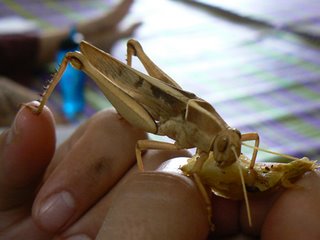
Hopefully, you get the idea.
Q: Alright fatty, anything else to add about Kaedi?
A: Yeah. I'd be remiss if I didn't toss this one up for you.

If you knew how many times John and I stood in the middle of those things singing Darude and doing the robot, you probably wouldn't be friends with me.
A note about the other trainees here. It's truly amazing how close you become with people who you've known for mere weeks when under these circumstances. For two and a half months the majority of us lived in various corners of Kaedi, spending much of our free time together. I had always looked at my move to Africa as a very personal and solitary experience, and up until now it has been shared with a number of others. And after those two and a half months are over, you've got new best friends who you're going to see all of three times a year, if at all. And if they ET - early termination - they just drop off the radar, as if you've never known them. It's all very bizarre.
Q: Let's get back to what you were actually doing. Aside from language classes, what did training entail?
A: Every few weeks we'd spend a couple days at the Lycee as a group, getting lectures and courses on medical issues, cross-cultural adaptation, security, and most importantly, our areas of expertise - in my case, teaching. For the latter group, everything culminated in a two week "model school," in which area students showed up for school in the summer. Considering the attendance record during the actual school year, I'm still not clear on how they got the kids to come. Each person taught a class each day while area teachers and other trainees critiqued them. I was blessed with fourth year English, which is the equivalent of eighth or ninth grade. I rule my class with an iron fist.
The end of model school basically coincided with the end of training. A couple of days later I packed up and said goodbye to my family, who I always regarded with a bit of detachment, but for whom I have infinite respect. My host father, who had returned home a couple of weeks before, bought me a Bubu (traditional Mauritanian garb) and called me Mauritanian, which was a pretty liberal call. Then we took photos, which appears to be the national pastime.

On September 8th, I was sworn in and officially became a Volunteer.
Q: So what now?
A: I was assigned to teach English at the Lycee in Nouadhibou, my new home for the next two years. Despite the fact that I specifically requested the harshest conditions possible, I was given the poshest assignment available in Mauritania. I have mixed feelings about this.
Nouadhibou is nice. It's situated on a peninsula on the northernmost portion of Mauritania's coast, and the economic capital of the country. It is a hub for the fishing and iron ore industries that keep this economy afloat, and home to a number of NGOs from Spain, France, and the Canary Islands. It has the Western amenities unavailable in the rest of the country, and I'm paid over twice as much as volunteers anywhere else in Mauritania. There is a bay in which dozens of ships have been abandoned, which is eerily beautiful. And as an added bonus, it actually gets cold during the winter.
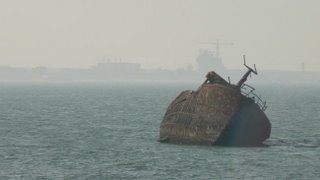
However, I can't get over the sneaking suspicion that A) someone thought I couldn't handle a more difficult site (which have caused a couple of other volunteers to ET mere days after arrival), and that B) I'm missing out on the experience I thought I was signing up for. I'm definitely isolated from the rest of the volunteers, but I was in no way anticipating an urban existence. My ego has been stroked
ad nauseam about why I've been sent here, but it just doesn't eliminate the hunch that I'm missing out.
Anyway, I've got a two bedroom apartment, which I'm sharing with Erin and Sam, a married couple who are the only other volunteers up here. They are staying with me until the veteran volunteer, Mark, moves back to the States at the end of October, at which point they will take his apartment. Erin has degrees in graphic design and education technology, and will be developing curriculum with the higher-ups in the Ministry of Education. Sam is a software engineer who will initially be working with a local technical school. They are interesting people, and I'm glad to be up here with them.
Q: So that's that, huh?
A: You got it, chief. I find out my schedule for the rest of the school year tomorrow. Oh, and Caro, in case you were worrying that I'm a total lard now, I've lost 22 lbs. Lucy, I got your package, and you are definitely in the lead on coolest thing received. Coming in a close second is the Beav with her graphic recollections of her life in 'Nam. My address remains the same for now, so please don't hesitate to send the following:
* Booze (Shipping glass is foolish. Put it in plastic.)
* Pictures
* Old war stories
* Articles about that guy from N'Sync coming out
* Powdered Gatorade
* Books (I prefer classics, but I'll read something new if you put your heart into the recommendation.)
* Cheap Aviators (As many as possible.)
* Music (See below.)
c/o John Langdon, PCV
Corps de la Paix, B.P. 222,
Nouakchott, Mauritania, West Africa
As for music, I've got an iPod and access to a computer, so it'd probably be best just to send things on a CD in MP3 format. I'm specifically interested in the following:
* The Mars Volta
* Pavement - Brighten the Corners
* Zero Zero
* Stan Getz
* Fela Kuti
* Benny Benassi - Satisfaction
* Tiesto - Delerium (Pat, I need this.)
* DJ Sets (House, D&B, breakbeat.)
* Tortoise
* Belle & Sebastian - Dear Catastrophe Waitress
* The Bronx
That's all I can think of for now. Pat, let me know what you're interested in sending, just because if it's not new within the last three months, I may have it.
That will be all.
[end transmission]
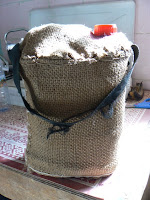 Today's special edition of TWPR (yeah, I know there are only two) is dedicated to one Kris Webb, brewer par excellence, who helped me with the logistics of this whole affair. Using a very marketable talent honed in the breweries of New Mexico, he has taken the formerly savage PCV custom of making homemade hibiscus wine (hereforth known as "brousse wine") out of the desert, taught it how to speak and act properly, and reintroduced it to high society as a cultivated art form. Kind of like a shitty version of "My Fair Lady." This is the go-to product for those looking to kill the pain of living in a dry country among goats and donkeys and that one person per day who thinks that you came over here solely to dole out visas to the person who lays it on thickest.
Today's special edition of TWPR (yeah, I know there are only two) is dedicated to one Kris Webb, brewer par excellence, who helped me with the logistics of this whole affair. Using a very marketable talent honed in the breweries of New Mexico, he has taken the formerly savage PCV custom of making homemade hibiscus wine (hereforth known as "brousse wine") out of the desert, taught it how to speak and act properly, and reintroduced it to high society as a cultivated art form. Kind of like a shitty version of "My Fair Lady." This is the go-to product for those looking to kill the pain of living in a dry country among goats and donkeys and that one person per day who thinks that you came over here solely to dole out visas to the person who lays it on thickest.
